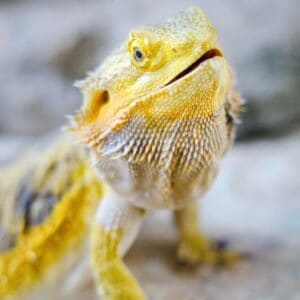Bearded Dragons or ‘beardies’ are popular pets due to their gentle and inquisitive natures. Many bearded even love a cuddle with their favorite humans. However, you might have some concerns about owning these beautiful exotic pets, such as whether they display aggression or bite?
Bearded dragons can bite a human. However, they are not known for trying to bite their owners on purpose. A bearded dragon biting someone out of pure aggression is rare. Typically these reptiles bite due to mistaking their owner’s fingers for food or out of discomfort or fear.
A bearded dragon can be a treasured member of your family and are typically a calm and gentle-natured creature. Most of bearded dragon owners never get bitten by their pets, However, there are instances where a beardie may bite. This article will discuss why bearded dragon’s bite, what instances may provoke them to do so, and how to prevent it from happening.

Bearded Dragon Temperament
Beardies are very friendly reptiles. They are rarely aggressive and don’t bite out of malice. Bearded dragons are popular because of their excellent temperament, making for a great first reptile pet.
These dragons are known to be calm and even like to cuddle sometimes. When it comes to male vs. female bearded dragons, their temperaments are similar. They’re usually aggressive only towards other bearded dragons to assert dominance or be territorial. Also, if a male is trying to mate with a female sometimes, they can be aggressive.
Beardies are so well known for their gentle nature that they’re highly recommended as pets even if you have small children. As long as you make sure your child is gentle to the reptile, it will respond similarly.
These reptiles also typically have no issues with other household pets such as dogs and cats. A proper introduction is necessary, but most of the time, once the bearded dragon has become adjusted, they do just fine with dogs and cats.
3 Reasons Why Bearded Dragon Bite
There can be a few factors that could cause your bearded dragon to bite. Biting isn’t a usual reaction these reptiles have, so it is essential to know that they aren’t biting to be aggressive or mean.
1. Mistaking Your Hand for Food
The most recurring reason your bearded dragon may bite you is that while you were hand-feeding it, it became excited and focused on the food. The reptile mistook your hand for the food as it was munching away at a tasty meal.
This bite is an accident and shouldn’t raise any concern with your bearded dragon. Maybe watch your fingers while holding a hungry bearded dragon and feeding them.
Also, if the feeding is over, but you still have the smell of the food on your hands, your bearded dragon may bite you, still thinking your fingers are food. So be careful when feeding to avoid getting a nibble from your reptile.
2. The Beardie Feels Unsafe or Threatened
This next issue is still not one of malicious intent, but you do need to monitor the situation to make sure it improves or not. If your bearded dragon feels unsafe or threatened by you, then it will bite as a defense tactic.
Biting in defense is more prone to happen when first getting your bearded dragon. Being in a new environment will cause anxiety and stress in your reptile for a short period. When they’re unfamiliar, they will be on high alert and ready to protect themselves from danger.
So, while the bearded dragon is trying to adjust, it may be scared of you at first and see you as a threat and bite at you.
This action is a widespread animal response to bite or scratch something seen as a potential danger, so don’t be alarmed. Try to make your reptile as stress-free as possible and introduce yourself slowly until it realizes you aren’t a threat.
Another reason for this behavior is that if they’re bearded baby dragons, they aren’t used to people yet. They may be fine in their new home but are still agitated by you. This agitation could mean they’re just not used to having people around yet, and they’re still trying to adjust.
If this behavior continues after a long time in its new home with its new owner, then there may be an issue that’s more cause for concern.
3. Handling Beardies Incorrectly
If the issues mentioned above don’t seem to be the reason your bearded dragon is biting you, then it may be a more serious issue: you’re not handling them correctly. Something you’re doing is upsetting them and causing them stress.
You could be accidentally holding them too tight or in a way that’s uncomfortable for them. This discomfort can cause them to get agitated and bite. Biting is one of the few ways they can communicate to tell you to stop doing something.
Also, if your beardie is being held and seems to want you to put them and you aren’t putting it down, then it may bite you to help you get the memo. Pets still have boundaries and sometimes don’t want to be held. If your bearded dragon isn’t used to being held, it may not like it for a while.
Please pay attention to what your bearded dragon is trying to tell you so that you can make sure it’s comfortable and feels safe around you. Also, make sure others are doing the same when handling your reptile.

Do Bearded Dragon Bites Hurt?
Yes, a bearded dragon bite doesn’t feel great. If it is a bite involving a sharp row of teeth, so it’s not going to feel great. Ultimately the pain level will be based on your pain tolerance and the bearded dragon.
How Strong is a Bearded Dragons Bite?
The older the bearded dragon, the harder the bite. Baby bearded dragons won’t pack as big of a punch in their bite. Either way, it will probably give you some level of pain, but it will only last a few minutes.
What To Do If You Get Bitten by a Bearded Dragon?
If you get bit and it breaks the skin, clean the area and put a bandage on it to avoid an infection like any other type of cut or scrape.
Are Bearded Dragon Bites Poisonous?
Bearded dragons are not poisonous, so there are no worries there. They are also not known to carry any rare, dangerous bacteria, so you won’t have to go to the doctor for a bite unless its an open wound to be on the safe side.
How To Make Your Bearded Dragon Feel Safe?
Since we’ve discussed how your bearded dragon may be wary of you until it gets familiar, let’s look at some tips on making your bearded dragon feel right at home. These tips can also help prevent getting bit.
1. Resist the Urge To Pick Your Beardie Up
When first getting your bearded dragon, it will be hard to resist the temptation to hold the cute reptile, but the experts at Reptiles recommend you refrain from doing so for about two weeks. Waiting to do so will give your dragon enough time to get comfortable in its habitat and with you.
2. Handling Your Beardie Correctly
When it’s time to hold your bearded dragon, ensure you support all four legs so it doesn’t feel off balance. Don’t make big sudden movements as it will scare them. They like getting a pet but make sure it’s slow and gentle movements so that you don’t hurt or scare them.
Bearded Dragon Body Language
Since you can’t talk with your bearded dragon, it is crucial to learn their body language so you can know if they’re agitated or not to avoid getting bit. Reptiles have different ways of communicating than other household pets such as dogs and cats.
- Dark Beard: If the beard on your dragon turns dark or black, it is upset. So whatever you’re doing, stop immediately. Their beard changing colors can also happen if they become too cold.
- Flexed Beard: This means they’re feeling territorial and need some personal space. They could do this towards you or other bearded dragons.
- Laying Flat: If your dragon lays flat like a pancake, they are scared of something. It could’ve been a loud noise or a sudden movement you made.
- Gaping: This is when your bearded dragon’s mouth is gaping open; no, they aren’t about to bite. They’re usually just hot and panting as a dog would do. Gapping is normal unless it happens very often, then lower the temperature.
- Tail Up: If their tail is up, they’re on alert. They do this when snooping around or looking for food.
How To Avoid Getting Bitten by a Bearded Dragon In The Future?
- Feed your bearded dragon regularly to avoid making it hungry.
- Handle it correctly.
- Keep it calm and avoid sudden movement.
Are Bearded Dragon Teeth Sharp?
Yes, bearded dragons have sharp teeth. (Read This Full Guide Post About Bearded Dragons Teeth!)
Are Bearded Dragons Venomous?
Yes, bearded dragons has a gland that secretes a toxic venom, However, its a mild venom and used often to paralyze small prey animals. (Read This Full Guide About Bearded Dragons Venomous)
What Does a Bearded Dragon Bite Feel Like?
It can feel like a weak pinch with younger beardies but the level of pain increase with mature bearded dragons.
What To do If You Have a Bearded Dragon Bite Wound?
First you need to wash your hands. Then disinfect the wound by using alcohol or Neosporin. Seek medical attention and consult a doctor if its an open wound to get a tetanus shot as its recommended to have one every 5-10 years.
Conclusion
Bearded dragons do bite. However, it is rarely malicious. These reptiles will often mistake your hand for food while excited about feeding time and take a nibble. On other occasions, they may be scared due to a new environment or because they are not used to people quite yet.
Lastly, make sure you’re handling them correctly, as this could cause discomfort and agitate them, causing them to bite. Remember, this is the only way they know how to communicate for something to stop. Learn your pet bearded dragon body language to keep it happy and your hands bite free.